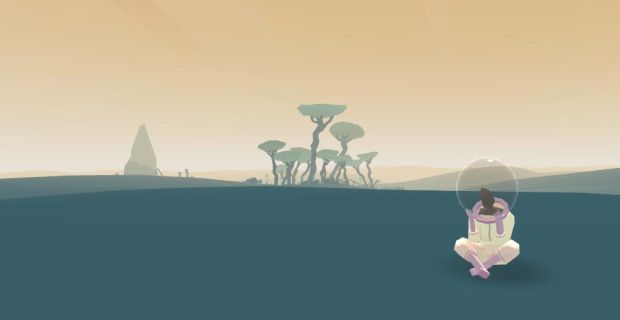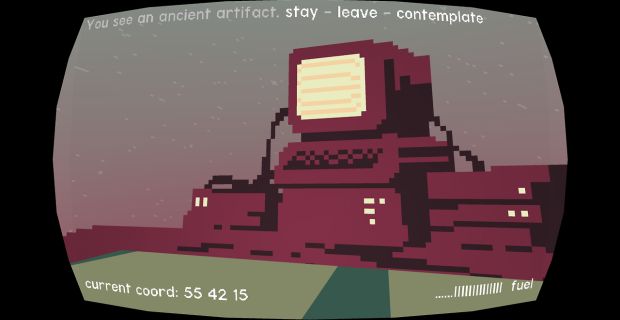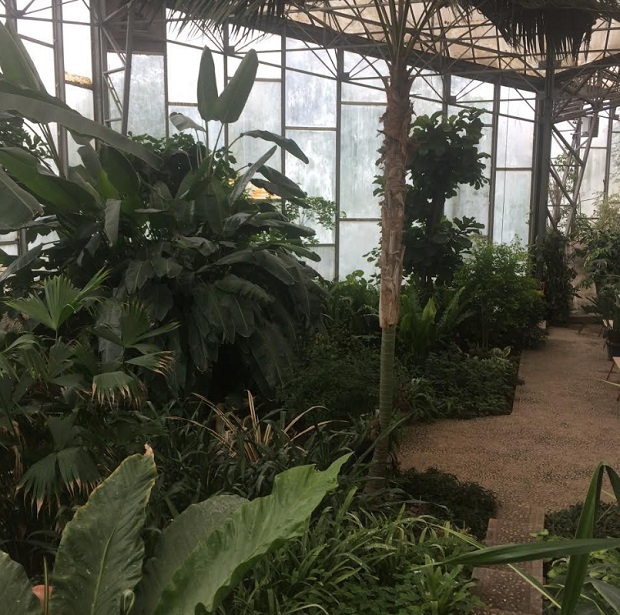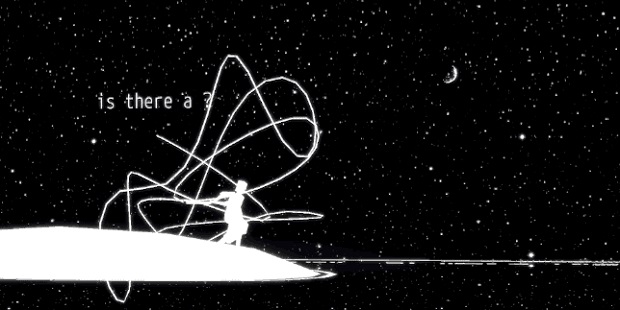Inside A Collective Part Three: Pol Clarissou
Orchids, puddles, sneezes
This is the third part in a six part series on the French games collective Klondike. This article focuses on one of the ten members of the collective: Pol Clarissou. Find out more about Pol at his website and follow him on twitter
Pol arrives the second day I’m in France. He and Tyu travel together to the central station in Lille, from Valenciennes, where they are days away from finishing a degree at a prestigious video game school. Pol arrives, dressed all in black, brandishing the stump of a baguette. He offers it around before finishing it himself.
Tyu, Gib and Delphine sometimes joke about Pol being the ‘famous’ one in the group (though he’s as quiet and unassuming as the rest of the collective). When we talk about the dynamics of the collective they mention how those of greater prominence can help platform the work of less well known members – and Pol is one of the former. He’s one of the more recent to join Klondike, but (despite being only 23) he’s been experimenting in game design for around 7 years; winning awards, selections and exhibitions since at least 2014.
Pol and I go for a walk the day after he arrives. In South England it’s been raining for weeks – constant rain – and I’m a little weary of it. I get to north France, and unsurprisingly the weather isn’t that different. Our walk is threatened by billowing clouds, we head to a park that I ran in earlier that day, and the sky spits at us.
Funding cuts mean the park is not as well maintained as it used to be, the ground is boggy underfoot, and vast swathes of once carefully cultivated flowerbeds and herbaceous borders, plus a vast structure of ponds and fountains, wallow in reservoirs of rain water.
I begin by talking to Pol about his background, how he came to be making games at the age of 17. He talks about having a very generalist education, enjoying drawing on the side, and then discovering games via an online forum:
‘Forum Dessiné’, in French, which is ‘drawing forum’, an online board where you could communicate only by posting drawings and, like, no text. And the creator of that forum was […] she’s the one who told me about games, introduced me to flash games on Kongregate. [And I thought] ‘Oh, this is actually interesting small-scale stuff in games that is relevant to me.’
One of the people on the forum asked Pol if he would proof-test her ‘learn Flash’ tutorial, so he… learnt Flash. That’s where it started.
I ask Pol: ‘did it feel like a lightning bolt? Like he had suddenly discovered the medium that suited him?’ and he hesitates. What he enjoys, he says, is newness itself – not necessarily the medium.
I always feel like that when I find something new: the realisation that what I did before was maybe not what I was into. And I’m afraid that it’s gonna keep happening over again, like, every time, because when I stopped drawing to do more interactive stuff I was like, ‘That’s much better,’ and then I started doing zines and print and I was like, ‘That’s also interesting,’ and I’m just like-, I don’t know, I guess I’m just kind of exploring.
We take a moment to work out what the French word for ‘puddle’ is. It turns out there are different words depending on the size of the ground-water. We settle on ‘une flaque’ for the path-spanning puddles we stride across, as Pol talks reinventing himself through his work:
I’ve got this tendency also to, like, be very compliant with whatever I’m doing until I find something else, and whoever I am before I immediately find some new way to be myself.
I ask what kind of questions or themes he feels drives his work (if any) and he explains that he tends to explore without intention to begin with:
I usually work on instinct but retrospectively usually what I do is I have an idea that becomes an obsession, and I try to put it down, and if it works out, like, quickly enough that it’s satisfying then I keep working on it, but I’m also someone who really quickly abandons ideas if they don’t work out, which is why most of my stuff is very small […] but also because I feel like I shouldn’t waste people’s time, neither my time in making the game nor players’ time in playing the game.
Does Pol think being a member of Klondike has had an effect on his work? He describes admiring their games for a while before being a part of the collective, settling mostly on the importance of peer support and inspiration.
[…] just the fact that you have people that you can talk to when you’re stuck, or when you have, I don’t know, feelings about games or whatever, just having that space to discuss and whatever, it’s super important.
Pol emphasises how important this is within the context of being in a videogames school (and by extension ‘industry’) that privileges a certain way of thinking about and making games. To not be alone in your critiques and challenges is vital; collective thinking can make greater leaps. He also talks about the importance of visibility for non-North Americanised approaches to games.
Having that big name over all of what we do allows us to have much more visibility, […] especially when the indie scene is dominated with North American stuff, and to a degree British stuff (because of language barriers mostly) it’s good that we have this visibility from France that is like, ‘Hey, we exist also,’
Pol explains that wasn’t an intention in setting up Klondike, but it is a result; visibility for different identities and approaches within experimental games.
Is there an explicit ‘Frenchness’ to his games, then? Pol’s hesitant, at once both agreeing that “there’s something French in, like, doing weird arty experiments.” Plus a difference in games from France compared to the Netherlands, or from Italy: “you can kind of see the backlog of culture that’s behind it”. He says there is a difference there, but also that it’s not an intentional difference, in fact, they (Klondike) often talk about working against ‘general French Culture’.
It’s very toxic in many ways. You know, we’re, like, this huge colonial cultural power clenching at its own roots because it’s feeling like it’s losing cultural power. Which it is, but that’s a good thing. […] So I try very hard to not to be assertive about the value of French culture in what I do, because I feel like that’s just a backlog of colonial heritage I don’t want to play with. But at the same time it’s important to push back the overwhelming presence of, America specifically, and just in general the English-speaking world in games.
Just as we begin to talk about his more recent work we stumble across a large Brutalist hot house in the centre of the park. We test a door, and are surprised to find it open. There is an empty education room with child-sized chairs toppled over to the left of us, we enter the main room and find Palaeolithic-sized plants; air heavy with foreign pollen. We walk past a bed of Desert Roses and unknown succulents into the heart of the giant vivarium, as tinny new-age music plays from unseen speakers. The air thick in odd ways, it begins to feel like we might have wandered into a scene from Pol’s Orchids to Dusk. I begin to sneeze as I ask about his more recent work.
We talk, first, about Wish Fishing. Pol describes the game as a ‘divination experience’, which is as perfect a description as I think you’ll find for it. At once riffing off the ancient tradition of fortune telling, but using Unicode symbols native to the digital and networked space of the game; highlighting how ancient symbols were seen as important enough to encode into our computers’ language in the first place. The experience of playing the game is one of ‘reading’ – of interpretation. You have to explore and know some of the language of computers (readme files), discover a glossary, and then, following in the tradition of things like the I Ching and Tarot, ask questions, and infer answers. The game animates the act of ‘wishing’, and connects us to the human-ness of the desire for control of our fates – as other players’ wishes from all over the world are also recorded in the fishing space. Pol talks about his intentions and influences:
Wish Fishing is [...] one of these weird experiments where you ask a question and you can get an answer, and you know the answer is just some random algorithm but you want to believe in it. And the fishing part, that’s an instinct thing […] just, like, waiting to see the answer and not knowing what it is. That was inspired also partly with Sophie Houlden’s Dream Fishing.
Pol describes the game as a “kind of modern take on divination through the mystery of technology”, using game tools to respond to ancient human impulses.
I’m sneezing too much now. So we leave the mystery abandoned hot house.
The connectivity – using the networked space to populate the divination space – of Wish Fishing leads neatly onto Orchids to Dusk. Pol describes Orchids to Dusk, (made with KO_OP) as “a short experience about dying in space alone, except not alone, that’s the interesting bit.”
You crash on an unknown planet, the colours are beautiful but toxic feeling, the plant life pulses and seems to breathe, with only a few minutes of oxygen left, you are invited to find somewhere to, well… die. Unlike how death is largely treated in games (as a mechanic for learning, jeopardy and improvement) in Orchids…, Pol explains:
the game is more about how you tackle the inevitability of dying than just trying to avoid it. And it uses the environment to kind of make the experience stronger when you do the ‘right’ things. […] I don’t want to spoil the game when I talk about it, so I’m always like, ‘There’s actually a plot twist’.
I also won’t spoil the twist, but when you play it, and you find it, I can describe the feeling of that moment – it’s like a reveal. In a tiny gesture, a tiny mechanic, the game opens up a huge question.
I wanted to make a game where the game itself is kind of big but the actual input of one singular player is kind of trivial [it] has a life of its own with all of the players shaping the environment, and the environment changing over time depending on what the players do.
The aesthetics of the game are at once beautiful and also alien, dangerous, switching ‘natural’ colours so that you begin to feel a little like there has been a shift in scale; that up has become down, and you’re no longer somewhere that will sustain you.
I wanted the sky to be blazing and kind of harsh. I wanted the plants to be organic and kind of a mix of, like, animal and digital features. […] the choice of a yellow sky was very important because I wanted it to be welcoming but also kind of [harsh], to evoke the fact that the planet is not welcoming […] like, ‘This is beautiful but also so much bigger than me, and it doesn’t care about me and I’m gonna die.’ I wanted all that, like, nuance in the environment, because the main point of the game to have people appreciate the fact that something that is gonna hurt them is also beautiful. It’s the contradictions that fascinate me always.
One of the things that draws me to Pol’s work, and to many of the other game designers’ work in Klondike, is how in small experimental games they often use tiny mechanics to gesture at huge themes. Games that are short, and often have very little agency for the player, that instead use small gestures to connect to our attempts to find order in chaos. A gesture we’ve made ever since we’ve been… human. In Orchids and Wish Fishing, Pol weaves this gestural un-agency in with networked traces left by other players – as if to underline the vastness as well as the loneliness of the territory. Alone together.
Rather than giving everything to the players and showing as much as I can, I try to trim down every unnecessary bit until I get some kind of, like, mysterious experience that is mysterious because it’s lacking a lot of stuff, to leave the players with enough room to imagine whatever is in the empty spaces.
I sneeze again.
“Bless you.” He says. “Sorry. It’s just like, that’s the season.”
You can read the rest of the Klondike series here. More episodes coming soon.















